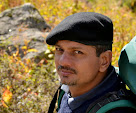Nag Tibba (Part-IV)
September-October is considered the best period for trekking in the Himalayan region. During this period, most routes are open and the skies are clear of clouds and mist. The foamy, thick clouds may look beautiful on parched deserts or canvas paintings but they are a great hindrance to scenic views in the hills.
On that bright April morning at Nag Devta temple, humbled by our false adventure the previous night, Gautam, Sukriti and I decided it would be a waste of half-hour to reach Nag Tibba if all we were to see was a misty surrounding. A slushy route, thanks to incessant rains whole of last night, and unrewarding prospects drove us back to Devalsari. However, to bring some novelty, we decided to tread the longer route down this time. In hindsight, it was a good decision.
It appeared that we were the first lot to have entered the route in the season. For, as we tumbled in a rush, carefully balancing the speed with nimble feet, we faced large cobwebs every now and then. It was the first time in my life outside TV screens that I came across human-size webs. I felt guilty of spoiling the bacon for laborious spiders (especially when I know one of their species was behind Peter Parker's powers and Sony’s fortunes). The downslide meanwhile kept on. Only that this time, there was no competition to stay ahead. Everybody looked disinterested in negotiating the cobwebs. Gautam the tortoise would be all smiles everytime he saw me peeling off skins of fishnets from my arms and face. My backpack was pushing me down faster than others and I would stop only when it became unbearable to carry on with a sticky nose. Such speedy down-stepping took a toll on Sukriti’s feet too. Either her shoe was not properly fitted or she had discarded thick cotton socks, as her limps grew with every lap. Thankfully, she didn’t complain.
It was a musical echo which slowed me down. Some woman was singing (not humming) a Garhwali song in close vicinity. The melodious voice pitched high and low, almost like a mountainscape and would pause for a long breath. Wordsworth's Solitary Reaper appeared in my vision but soon I realized there was not one but two voices — one slightly untrained but no less melodious. It was like a jugalbandi composition. One would leave on the spur of a note and the other voice would pick it up, take it to another unfinished note and leave it for the other. I was so lost that I didn’t realize when Sukriti had sat beside me and was also engrossed in the musical mood. Her eyes showed the same appreciation and admiration which must be glowing in mine too. I still can’t recount how long it lasted.
Gautam has quite often showed me an ear for good old Bollywood beats, but to expect him understand the nuances of a spontaneous folk song would be too much. He arrived on the scene and stopped in his tracks — completely deaf to the music around him — and looked wide-eyed at us sitting motionless. The commotion which followed silenced the music. I got up with Sukriti and looked around. A few paces down to our left, I could see two womanly figures, cutting grass at a slope, standing about 40 meters from each other. Their musical notes bound them with each other, and briefly us too, through an unseen thread. Those two musical voices were part of the many delights that nature performs unseen and unheard from the humankind. Even today when I am writing these words, that undecipherable song still rings in my ears; its low and lofty notes soothing my heart.
Thereto it was another speedy rundown. After a small break at Devalsari, with some free buttermilk which was so thick that it satiated our hunger pangs, we sped off again to Thatyur. With some haggling at a lodge, we secured ourselves a neat room with extra bedding for 200 bucks. I fished out the leftover rum from my sack and polished it off amid the three. This was followed by forcing a few old Hindi songs on my trek partners and a drunken argument with Gautam. I have no idea what was the reason for our disagreement when I hit the sack.
The next morning was another familiar round of rush-rush. We jumped into a jeep going Dehradun at the last minute, deposited the rented equipment to Upendra Arora, who refused to accept the money and to add insult loaded us with paranthas. The bus to Delhi was leaving the terminus and stuck in a small jam when we boarded it. The first thing Sukriti did after finding a seat was to kick off her shoes. Her feet were a sight, showing mangled skin and raw sores. I jumped out of the bus and quickly got back with some band-aids, while the driver argued with fellow road-users. By the time the sleepy trio got down at Delhi ISBT, a lot had changed in our lives in past 96 hours. We were never going to complain about a broken footpath, a long walk, or a half-cooked meal again.
Subscribe to:
Post Comments (Atom)

5 comments:
Just back from a trek to Tunganath and Deoriya Taal - hadn't been that side before. Awesome!
But you have not mentioned who administered the band aid and how :)
Apart from being double, the two were reapers eh?
I chanced upon your blog searching for some info on Nag Tibba. Excellent account.
Hey Hill Goat! Liked your posts. And my food blog has now been revived (I had forgotten how to get into it!). I saw your comment on one of my food posts this morning.
Post a Comment